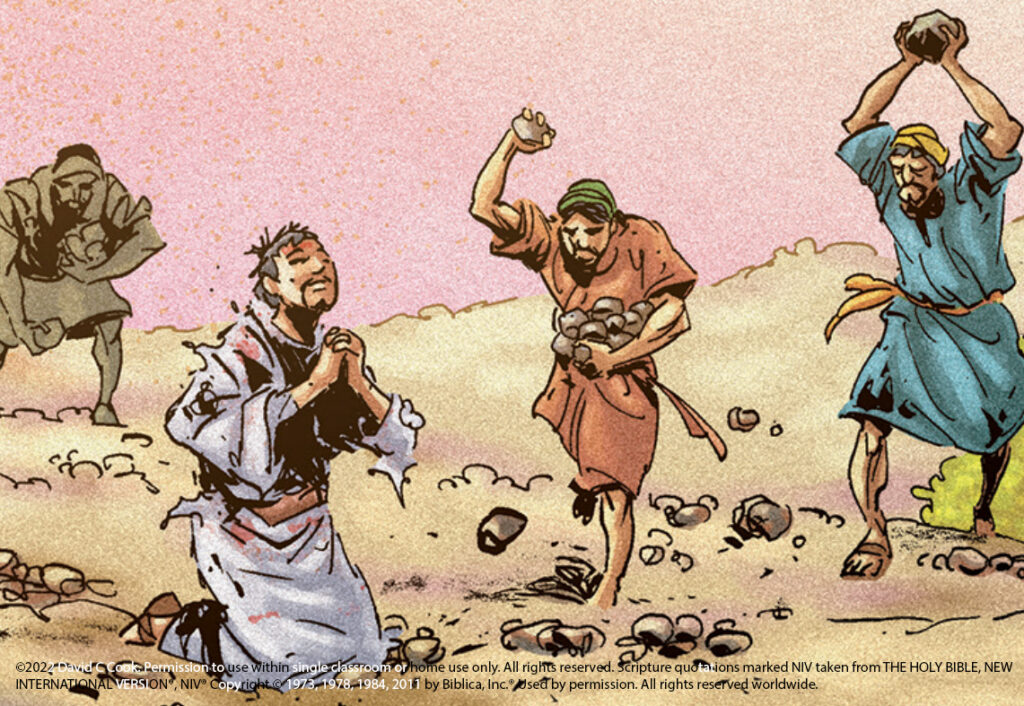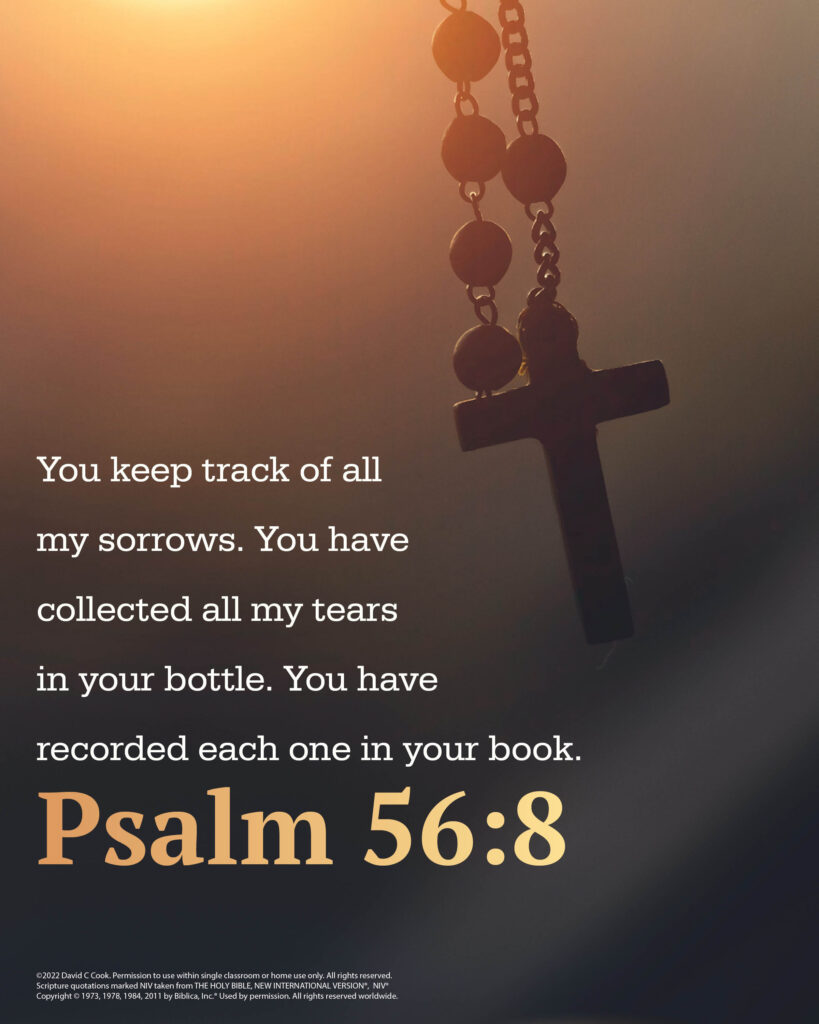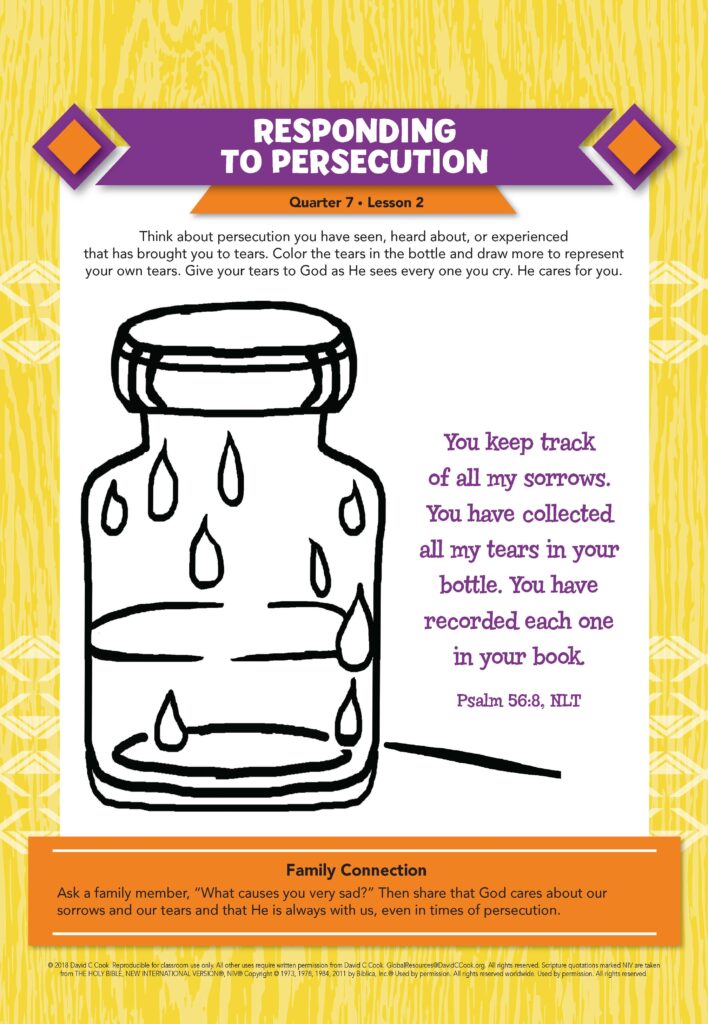During the lesson, the information for you to know is written in regular type, and what we suggest speaking or reading aloud to children is in bold. All resources for this lesson, including the Teacher Guide, Student Page, Family Connection Card, and other resources can be downloaded in a ZIP file by clicking on the following link:
In some lessons you will find "resource articles." These are articles written by experts from around the world to help equip you for your work with children and adolescents. Share them with parents or guardians if you consider it appropriate.
You keep track of all my sorrows. You have collected all my tears in your bottle.
You have recorded each one in your book.
Psalm 56:8 NLT
Everything changed for Akhom and Hassani the day the peaceful Christian march erupted into violence. Rocks, bricks, and glass rained down as protestors confronted the marchers. The violence grew. Akhom was shot 3 times in the face and once in the stomach. Hassani’s face was sliced with a machete. As they healed from their wounds, Akhom’s and Hassani’s faith grew. “A new vision came after the attack,” Hassani shared. “My heart was opened to realizing the grace of the Lord.” Akhom added, “We have to rejoice in what the Bible tells us. If persecution happens in our lives, then it means we are going the right way.”
God knows the hurts of those who are persecuted. He knows your sorrows as well. Each tear you cry is collected and each suffering recorded. Think of a time when you felt deep sorrow. Your Father was with you and saw every tear, as He sees every tear of each one who is persecuted. God can bring peace and forgiveness even in the most painful situations.
Encourage the students to ask a family member, “What causes you sorrow?” They can then share that God cares about our sorrows and our tears and that He is always with us, even in times of persecution.
Teacher Tip: If possible, email or text the Family Connection Card to the families of your students.
Greet the students as they arrive. Ask if they observed any persecution in the past week. Invite them to share their stories with others. Remind them not to use the names of the persecuted or the persecutors. They should share only the situations.
Thank you for sharing the persecution stories you have seen and heard about. Now I am going to tell you another story. This story is about Christians who were persecuted in Uganda.
King Mwanga of Buganda noticed a change in some of the officials who served in his court. Unlike the traditional territorial chiefs, these young men were well-educated Christians who looked for ways to make positive changes in their society. Threatened and angered by their influence, King Mwanga accused the Christian young men of disobeying him, so they were sentenced to be executed.
The Christian teens were marched to Namugongo. For an entire week, they were bound and tortured as the executioners collected wood to build a huge fire. Then, on June 3, 1886, they were mutilated and thrown into the flames. As they gave their lives for God, the young martyrs praised Him for saving them for all of eternity.
Allow 2–3 students to share their thoughts. Then guide them to understand that the martyrs found hope through their faith in Jesus.
Allow 2–3 students to share their thoughts.
The lives of 45 Christians ended that day. But that is not the end of their story. Though King Mwanga expected this violence to end the influence of Christianity, God used their deaths to do something amazing. Ugandan missionaries grew more courageous and began sharing the story of Jesus’ love, and Christianity grew in Uganda. Every year on June 3, Christians in Uganda and all over the world celebrate the faith and courage of the young men who were persecuted and died in Namugongo. Because of their sacrifice, people all over Uganda now have forgiveness and hope in Jesus.
Hearing stories about others who have been persecuted can help us to understand what it feels like to be persecuted and to fear persecution. This understanding helps us decide how we should respond to persecution. Today we will talk about how to respond to persecution.
In our last lesson, we learned that people are persecuted for many different reasons. However, the main reason people are persecuted is because of their religious beliefs. Christianity is one of the largest religions in the world, and Christians are persecuted more than followers of any other religion. Listen to this true story from the Bible about a believer who faced great persecution for his faith.
After Jesus returned to heaven and His disciples spread His message, many people began to follow His teachings. One of them was Stephen, a faithful believer who shared his love for God with many people.
Stephen was full of faith and godly wisdom. But some men disagreed with him and his faith. Because they could not win the argument, they persuaded others to lie to the authorities about what Stephen was saying. Stephen was arrested. If he was found guilty, Stephen faced death by stoning.
As his defence, Stephen spoke the truth. He retold the history of Israel and their relationship with God. He reminded the people that they had been unfaithful to God, but that God had always been faithful to them.
Stephen’s accusers became even angrier. They forced him out of the city so they could stone him.
As Stephen faced almost certain death, listen to what he said.
Have a student read Acts 7:60 aloud from the Bible. If that is not possible, the verse is printed here.
Then he fell on his knees and cried out, “Lord, do not hold this sin against them.” When he had said this, he fell asleep.
Acts 7:60

Allow students to respond. If they do not mention it, guide them to understand that he prayed for his persecutors.
In this situation, Stephen was being persecuted by people of his own faith. Not all persecution comes from followers of different religions or from governments or other groups. Often, people with strong beliefs will persecute others who disagree with them on even small points. These types of disagreements can cause division and often lead to violence. Stephen’s example can teach us how to respond to persecution.
Stephen defended himself by speaking the truth. When he was confronted with arguments, questions, and persecution, he relied on God’s truth. Stephen felt peace as he spoke the truth, even in the face of danger.
In difficult or dangerous situations, we can always pray and ask God for wisdom and trust in His guidance.
Stephen asked God for help as he was persecuted. You can call out to God, too. Listen to what the Bible tells us about calling out to God.
I call on the LORD in my distress, and he answers me.
Psalm 120:1
Guide the students to understand that they can trust God always. He cares deeply for them and their pain. He will never leave them alone, even in times of persecution.
Stephen prayed for and forgave his persecutors. The Bible clearly tells us that we should pray for those who persecute us.
But I tell you, love your enemies and pray for those who persecute you.
Matthew 5:44
Guide students to see that we can pray for them to know God’s love and to accept His gift of grace and forgiveness.
Guide the students to understand that prayer and forgiveness may not change the hearts of the persecutors but they can change the hearts of those who are praying.
Stephen trusted in God so much that he died in peace even though he was being stoned, which is a very painful way to die. You can trust in God, too. He is always with you, even in times of persecution. He cares about your pain and your sorrows.
Even if you do not experience persecution yourself but you hear about it or see it, you may feel you should do something to help. God’s Word tells us how to respond to those hurting around us. Listen to this verse:
Have a student read Romans 12:15 aloud from the Bible. The verse is printed here for your reference.
Rejoice with those who rejoice; mourn with those who mourn.
Romans 12:15
Listen to what the Bible says about God’s concern for your sorrows.
Show the Memory Verse poster if you are using it.
You keep track of all my sorrows. You have collected all my tears in your bottle.
You have recorded each one in your book.
Psalm 56:8 NLT

God keeps track of all the painful things that happen in our lives, including persecution. He loves us so much that He remembers every tear we cry—every single tear! As we heard a few minutes ago, He also wants us to weep with those who weep.
Pause to allow the teens to think of situations of persecution in their lives or the lives of others they know. Be sure that you do this activity along with your students.
Now cup your hands together and lift those painful things up to God. He sees every tear. He cares about everything we have experienced. He will bring us comfort.
Pause for the students to symbolically give their tears to God. Do this act of worship with them. As they see you trusting in God, they will be encouraged to trust Him, too.
Optional Supplies:
Give the students paper and coloured pencils or markers. Tell them to draw a bottle. In it they can draw or write about persecution they have seen, heard about, or experienced that has brought them tears. They can tear their papers up as a signal they are giving that persecution to God.
If you are using the Student Pages, they can do this activity on these pages.
End of Option.

Close the class with a blessing based on Psalm 56:8.
Blessing: May you always know that God remembers all your pain and tears, and He cares deeply for you. May you trust Him to bring peace and comfort in times of persecution.
Lead the children in singing this quarter’s song, if possible.
Life on Life ©2020 David C Cook. Reproducible for home or classroom use only. All other uses require written permission from David C Cook [email protected]. All rights reserved.